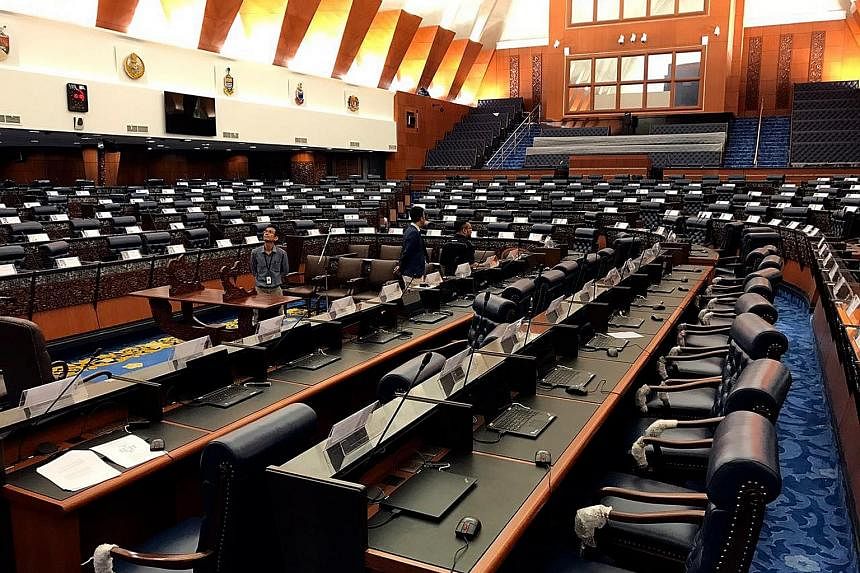Malaysia's Parliament will reopen today, with the Najib administration set to push through a controversial Bill to strengthen Islamic courts, a move that will influence the country's upcoming general election.
The Bill has caused a big split among the opposition parties, making unlikely allies of the opposition Parti Islam SeMalaysia (PAS) and Prime Minister Najib Razak's ruling Umno party.
This parliamentary session is likely to be the final one before the next general election, which many expect to be called this year. It is thus the final major opportunity for Datuk Seri Najib to ensure that the opposition remains divided by supporting the private member's Bill by PAS president Abdul Hadi Awang to amend the Syariah Courts (Criminal Jurisdiction) Act, known in Malaysia by its Malay language acronym RUU355.
The Bill proposes to extend the sentencing powers of Malaysia's Syariah Courts, which govern Muslims and Islamic matters such as marriage and inheritance law, in parallel with a civil court system. But it is widely seen, by Muslims and non-Muslims alike, as a backdoor push by PAS and Islamists in the government to introduce a harsher Islamic penal code, or hudud, in Malaysia.
-
THE SYARIAH COURT'S CURRENT 3-5-6 PUNISHMENT
-
3 YEARS, MAXIMUM IMPRISONMENT
5,000 RINGGIT FINE
6 STROKES OF THE CANE
RUU355 WILL RAISE THESE TO A MAXIMUM PUNISHMENT OF
30 YEARS IN PRISON
100,000 RINGGIT FINE
100 STROKES OF THE CANE
The Syariah Court today can mete out what is called the 3-5-6 punishment, that is, imprisonment of up to three years, a RM5,000 (S$1,583) fine and six strokes of the cane.
RUU355 will raise these to a maximum punishment of 30 years' prison, a RM100,000 fine and 100 strokes of the cane.
Already twice delayed last year due to protests from Mr Najib's allies in the multiracial 13-party Barisan Nasional coalition (BN), this Bill also caused massive rifts among opposition parties, notably, a bitter feud between PAS and the secular Chinese-dominated Democratic Action Party (DAP) that caused the previous opposition coalition Pakatan Rakyat to disband in 2015.
Now that Umno is cosying up to PAS and burnishing its own Malay- Muslim credentials by supporting stricter Islamic laws, the prospect of three-cornered fights in the upcoming election looms, dashing hopes of an opposition pact strong enough to topple the ruling administration.
"By doing this, Umno prevents PAS from working with the rest of the opposition. But Umno will still contest against PAS and in a three-cornered fight, Umno wins," head of the Ideas think-tank Wan Saiful Wan Jan told The Straits Times.
Due to skewed electoral maps, maintaining a slim majority of Malay support will be enough to return the handsome parliamentary majority - 133 to 89 - Mr Najib's government enjoyed at the 2013 polls.
A proposal to redraw electoral boundaries, which critics say further skews polling districts towards Umno's favour, is also under way, and must be approved by Parliament before taking effect for elections due by August next year. However, court action by the opposition has held up the process for now.
But despite PAS mustering more than 20,000 supporters in a rally to support RUU355 last month, a vote on the matter could be delayed as Umno is also mulling over snap polls for Sabah state.
Hudud is largely unpopular in multicultural Sabah and its fellow east Malaysian state, Sarawak.
Even including its Sabah MPs, Umno has 86 federal lawmakers, while PAS has 14. Combined, they still total fewer than the 112 required for a simple majority in Parliament. However, the vote on the Bill could still be passed should Muslim representatives in the opposition - already struggling to maintain Malay support - abstain, rather than vote against. Sarawakian MPs could also be convinced to do the same.
"Even some opposition non-Muslim members are coy as they have sizeable Malay voters in their constituency," S. Rajaratnam School of International Studies' senior fellow Oh Ei Sun told The Straits Times.


